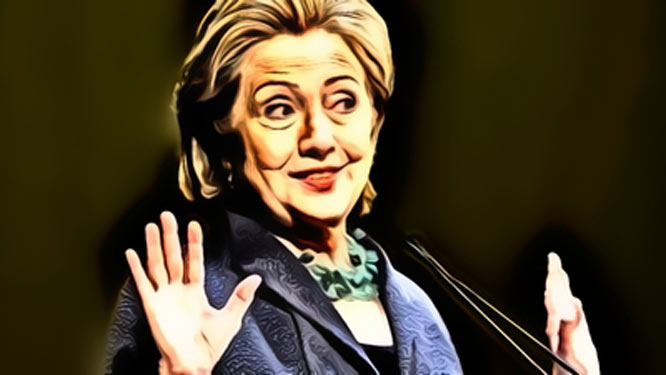
There are lots of ways campaigns have to annoy voters, but one is, on its face, illegal. Federal regulations prohibiting the use of an automated dialer to interact with cell phones have long ensured that campaigns that happily bombard voters with phone calls, direct mail, door knocks, and digital ads steer clear of unsolicited text messages, despite their obvious promise as a tool for political communication.
That is why, within the swelling field offices Hillary Clinton's campaign has spread across battleground states, there is uncommon enthusiasm for a new homegrown software product called Megaphone, which permits the deceptively straightforward task of managing individual conversations with supporters by text message and e-mail.
"It blurs the line between digital and grassroots field," said Jeremy Bird, who served as national field director of President Barack Obama's 2012 campaign and is now an outside adviser to Clinton's. "It uses text messages the way you would use the phone or a door knock."
The Telephone Consumer Protection Act, which became law in 1991, reflects the reality that, unlike traditional landline phones, mobile users pay for unsolicited incoming communications. With no exception for political speech, campaigns were forbidden from sending text messages to voters unless granted specific authorization to do so.
Requiring recipients to opt in made text messages useful only as a tool to engage with individuals who already actively supported the campaign. In 2008, Obama's campaign aggressively collected mobile phone numbers - the campaign promised, ultimately in vain, to announce his vice-presidential pick via text message - but mostly used the list to send impersonal messages like appeals for money. "When text messaging started as a tactic, it was very much like most of our paid voter-contact tools, which is one-way," says Bird. "It was used as a blast to get information to people."
It has since became possible for campaigns to acquire mobile contacts for a large chunk of the electorate, as private-sector data warehouses can provide phone numbers that are then matched to names on a voter file. But the 1991 law, later reaffirmed by a Federal Communications Commission declaratory judgment, has remained in force. (Violations risk a fine of $500 per message.) Campaigns were forbidden from blasting text messages to those who had not signed up to receive them, leaving most persuadable voters or passive supporters beyond the campaigns' mobile reach.
The situation began to change last year, when field organizers for Bernie Sanders discovered Hustle, an app developed by a San Francisco-based startup that allowed senders to aim individual text messages at a long list of recipients in rapid-fire fashion. By ensuring that each message was manually sent, Hustle satisfied legal requirements while nonetheless permitting text-message tactics at scale. Once a voter responded to a message, the organizer could begin a personal exchange, which would be logged so that others on the campaign could pick it up later on. Sanders staff in Iowa found it much easier to recruit supporters to attend the party's Jefferson-Jackson Dinner by writing them over Hustle than it was to call them with an invitation. Voters who might be wary of a phone call from an unrecognizable number, it appeared, readily opened a text message from one. "There is a Bernie diaspora, and all those people started using it," said Ysiad Ferreiras, Hustle's head of sales and marketing.
Word of Hustle moved quickly through the lefty organizing community, which has been vexed by the challenge of getting the attention of mobile-dependent voters who screen calls to their phones and face inboxes saturated with blast political e-mails. In several early primary and caucus states, Clinton's campaign tested the text-messaging platform as a method of voter contact. According to federal disclosure reports, Hillary for America paid the company a total of $22,000 over two months.
The Clinton campaign has since built its own software platform that serves a similar function, built specifically for the purposes of a partisan political campaign. According to people who have seen and used it, Megaphone mimics Hustle's capacity to manage a large volume of individualized text message conversations and integrates with the campaign's e-mail system. A Clinton campaign spokesman did not respond to a request for comment on Megaphone's development and use.
Unlike Hustle, Megaphone was engineered to interact seamlessly with the NGP VAN interface that Democrats use to access voter data. Clinton targeters can isolate voters they want to reach with an individualized text message the same way they would select them to be contacted by a phone bank or by a canvasser-most likely for get-out-the-vote nudges close to Election Day. With information flowing both directions via API, digital conversations with voters automatically feed back into their individual records-meaning that, in theory, a text-message exchange initiated by a single organizer can be made available in perpetuity by Democratic campaigners.
"What Hustle does, what Megaphone does is use technology to facilitate the organizing relationship," said Bird.
"Is it a digital tool?" he asked. "I don't know. Is the phone a digital tool?"
Previously:
• 02/18/16: The coming war for the Dems' caucus archipelago
• 02/12/16: For Hillary to survive, Clintonism had to die
• 11/25/15: A new data-mining technique to uncover New Hampshire 'influencers'


 Contact The Editor
Contact The Editor
 Articles By This Author
Articles By This Author
